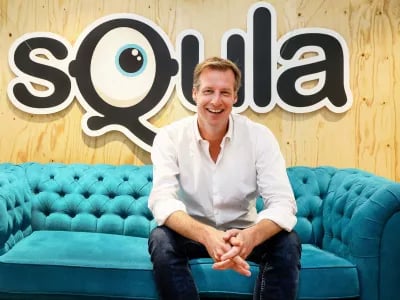The pandemic has led to a rapid acceleration of the digitalisation of society. That's particularly true for elementary and secondary education, where 'digital learning' seems to have become the new normal in the blink of an eye. A skilled teacher remains the optimal route to intellectual and especially social-emotional development for young children, according to Serge Bueters of Futurewhiz, the developer of digital learning plaforms for education.
The first lockdown has had a major impact on education. Students were set back and faced learning delays, kids from disadvantaged backgrounds 'disappeared' off their teachers' radars, and the strain on parents was immense. What is the situation like right now?
“The past year has been one big experiment in digitalisation of education. Some things worked out really well, and others didn't. Overall, though, educational institutions were quick on the uptake and learned a lot about what works and what doesn't. During the first lockdown, starting in March 2020, parents got a lot on their plates – I can tell you from personal experience, with four school-age kids. But my impression is that the pressure was already a lot lower during the second lockdown in the fall. The fact that the Netherlands was already a European frontrunner in digital education definitely made a difference. Having said that, of course the situation is far from ideal. Especially for kids in elementary school, being taught face-to-face by a qualified teacher is the best guarantee for their development. The physical school building will remain very important in the future to provide a safe place for children to learn, and to facilitate teachers in their roles. As for learning delays, they may arise because teachers haven't been able to communicate knowledge one-on-one for a long time. One thing that kids can do very well online is exercises – exactly what we focus on with Squla. But digitalising exercise books is something entirely different from knowledge transmission through classroom instruction, let alone classroom interactions.
Before COVID, we were already dealing with a structural shortage of qualified teachers. Would we be able to eliminate that shortage by moving further toward digital education?
“The shortage of teachers is a consequence of the fact that the way we've designed our education system for kids and young people is no longer suited to the times. And by that I mean classical education, which casts every child more or less in the same mould and forces them to comply with certain criteria before they can move on to the next year. It's a form of education that is very labour-intensive – in the sense that it requires a lot of well-trained teachers – and it works best with a relatively homogenous classroom. And as it stands, as a society, we're not equipped to organise and fund this type of education efficiently. That creates an ideological problem. Because when schools start to 'solve' that problem by asking for an additional 'voluntary' contribution from parents, the danger is that you start to slide from a public school system to a mixed British system with public and private schools. I am definitely not in favour of that. For me, the causes of the teacher shortage are deeper, and only moving towards more digital education cannot be the solution. At least, not in elementary education. In secondary education, things might be different, because there you can ask for more personal responsibility and self-reliance from young people. In that case, we think it's very possible to support the teacher's role with online instruction tools and methods. That's where Futurewhiz is also focusing its innovations right now: we're transforming our platform WRTS for secondary schools into a much richer product.
What should we understand by that, exactly?
“We're developing so-called 'learning loops' that help kids comprehend material and practice it. Additional instructions can help them with their homework or to prepare for a test. There are short videos in which teachers explain certain topics, after which the students take a diagnostic test to check whether they've understood the material and whether they need further instruction. We've added an additional support channel with a chat functionality, allowing students to ask questions to our team of teachers. Since recently, they can also ask questions over a live video connection. This gives a student access to much-needed additional support that can't always be available on demand from their own teacher, school, or parents. We're expanding the platform step by step. We started with six subjects in the first year of secondary education (vwo/havo school tracks in the Dutch system). We're now adding the second year and we're starting with the vmbo track. And the beautiful thing is that a product like this can be affordable, especially compared to the rates of traditional homework tutors.
The business model of Squla and WRTS is a subscription for parents – while schools can use the platforms for free. Doesn't that play into the risk that children of more well-heeled parents will have an advantage over children whose parents cannot afford to subscribe?
“Well, as I said: the financial barrier is relatively low for parents, at less than eight euros per month. Besides, it's not our ambition to replace teachers but to support them. They will have more time for weaker students when the stronger students are equipped to be more self-reliant. In addition, we're working together with parties like the Jeugdeducatiefonds [Youth Education Fund] and Stichting Leergeld [Tuition Fee Foundation], so that children whose parents cannot afford to subscribe will be able to access our platforms for free. But it's true that you can't compensate for everything: for a poor family in which four children share a single old laptop, digital education is not the solution. The same goes for rural areas where broadband internet is not yet available – we also operate in Germany and Poland and you can clearly see the divide between the big cities and the periphery. In Poland, online education has been the norm for nearly a year, but not everyone can benefit from that. For teachers, we make Squla free to use in the classroom. And during the lockdowns, we also made it available for free if teachers wanted to use it for home schooling. Nevertheless, we've seen that children from less advantaged socio-economic environments use our tools less than children from the middle and upper classes. And that has everything to do with the infrastructure and the involvement of parents. If they are less convinced of the value of good education, there is not much we can do to change that. That's one of the reasons I think we'll never be able to go without schools and teachers. Education without teachers is a fairytale."
There's been some criticism of the fact that, alongside these online 'solutions', tech companies have entered schools as suppliers. What do you think about the possibility that this position of dependency might be abused? Is that something we should all be watchful of? Or can it be left to the free market?
“The thing with schools is that they have a natural dislike of monopolists. I think that when they become too dependent on one system from one supplier, they'll naturally start to shift toward competitors. With our products, this is not a relevant problem, because we don't have a financial relationship to schools, only parents. Teachers can use our platforms for free in the classroom, the only thing we ask of them is to give us some feedback once in a while so we can improve the product. So I don't see us as being part of this discussion. But I do have some concerns about the Google Classrooms and Microsoft Teams of the world. Half the country ran on Google Classroom, but nobody had to pay anything for it. In the long run, that isn't going to fly, of course. So I think there will have to be European regulation to safeguard the privacy of teachers and students, as well as the integrity of school data. That's definitely something to keep an eye on."
Read more: Futurewhiz, parent company of squla and wrts, acquired by NPM Capital













